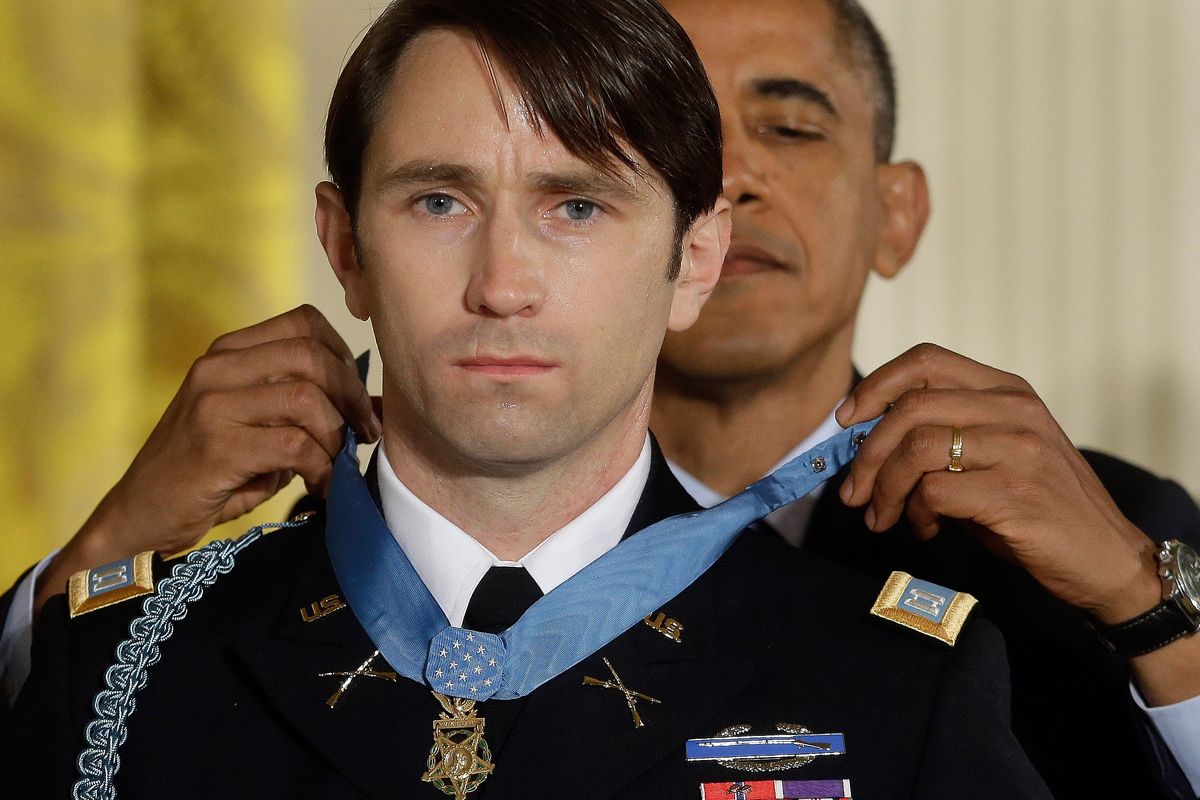William D. Swenson, ex-Army captain from Seattle, given Medal of Honor

WASHINGTON – A former Army captain was awarded the nation’s highest military honor Tuesday for his bravery, caught on video, during one of the deadliest battles in Afghanistan at a somber, sometimes emotional White House ceremony.
President Barack Obama bestowed the Medal of Honor on former Army Capt. William Swenson for his actions during a deadly six-hour battle in Afghanistan in 2009. The battle has been the source of controversy for years in part because Swenson failed to receive the air and artillery support he had requested.
Obama praised Swenson in brief remarks in the ornate East Room before fastening the light blue Medal of Honor ribbon around his neck. Swenson stood still, visibly perspiring, his hands clasped together in front of him. But as Obama spoke about the battle’s victims, Swenson struggled to compose himself, and a single tear rolled down his cheek.
“Moments like this, Americans like Will remind us of what our country can be at its best – a nation of citizens who look out for one another, who meet our obligations to one another not just when it’s easy, but also when it’s hard. Maybe especially when it’s hard,” Obama said.
Vice President Joe Biden, first lady Michelle Obama and Defense Secretary Chuck Hagel sat in the front row, alongside members of Congress. Swenson’s parents, Julia and Carl Swenson, and his girlfriend, Kelsey, were in the audience, as well as family members whose loved ones were killed or saved in the battle.
Swenson resigned from the Army in February 2011. He lives a quiet life near the Puget Sound in the Seattle area, where he is unemployed. He has asked to return to the Army, and his request is expected to be approved.
Obama described Swenson as a “pretty low-key guy,” who would rather be on a mountain in the Pacific Northwest or on a trail surrounded by cedar trees instead of at an elaborate ceremony in front of hundreds of people at the White House.
Swenson, 34, did not speak at the ceremony, but he later addressed reporters who had gathered in the White House driveway.
“Today I stand with the Medal of Honor,” he said. “But this award is earned with a team, a team of our finest. Marines, Army, Air Force, Navy and our Afghan partners standing side by side. And now that team includes Gold Star families who lost their fathers, sons and husbands that day. This medal represents them. It represents us.”
The ceremony comes two years after Obama honored Marine Sgt. Dakota Meyer at a similar White House event for his role in the same battle, a role that remains the focus of an ongoing McClatchy investigation that has determined crucial parts of his story were untrue, unsubstantiated or exaggerated, as were parts of the Marine Corps and White House accounts of how he helped extract casualties from the valley under fire.
About half a dozen living recipients of the Medal of Honor attended the ceremony Tuesday, though Meyer did not. The Congressional Medal of Honor Society had invited all 79 living recipients, according to a spokeswoman.
Swenson is the 13th recipient to be awarded the Medal of Honor from the Afghanistan and Iraq wars and the first living Army officer nominated for the Medal of Honor in four decades.
He was nominated for his role in the Sept. 8, 2009, battle of the Ganjgal Valley, which erupted when about 60 Taliban-led insurgents ambushed a contingent of Afghan troops, border police and U.S. trainers. A McClatchy reporter embedded with the Marine trainers was caught in the ambush.
Swenson returned repeatedly to the battlefield – including for a final run with Meyer, two other Marines and an Afghan translator – to recover American and Afghan casualties under fire. “Will Swenson was there for his brothers,” Obama said.
The Medal of Honor has been given nearly 3,500 times but, as Obama said, never before had Americans been able to witness the valor that led to the honor. Video captured from cameras mounted on the helmets of pilots, though shaky and grainy, showed Swenson delivering his badly wounded sergeant, Kenneth Westbrook, to a helicopter and placing a kiss on Westbrook’s head.
Five American and nine Afghan service personnel and an Afghan translator died; 17 others, including Swenson and Meyer, were wounded. The battle resulted in the two Medal of Honor nominations as well as a slew of other commendations. Meanwhile, two Army officers received career-ending reprimands for dereliction of duty for spurning calls by Swenson and others for artillery and air support for 90 minutes.
An Army narrative of Swenson’s actions and sworn statements by American participants in the battle conflict with details of Meyer’s 2012 memoir and the Marine Corps and White House versions of his actions prepared for his Sept. 15, 2011, award ceremony. The Marine Corps and the White House have defended their narratives of Meyer’s actions as accurate.
Meyer’s Medal of Honor nomination – submitted two months after Swenson’s was put in – sped through the approval process and led to a book contract, high-profile media appearances and celebrity that Meyer has used to help jobless veterans find work. But Swenson’s nomination from December 2009 inexplicably vanished from every military computer system midway through the approval process in 2010 during what the Army later claimed was a bureaucratic foul-up due partly to high staff turnover at the U.S. headquarters in Kabul.